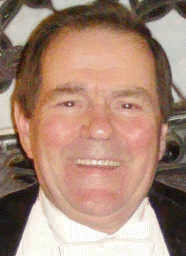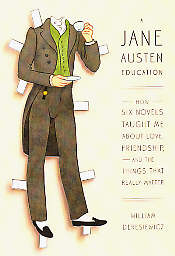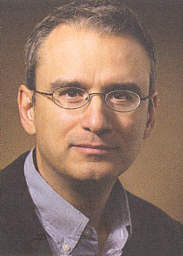When I met the author he was lecturing about this book, and he began by saying, "The
first Jane Austen novel I read was Emma, and it was a breakthrough to me!" His words took
me aback because it could have been me saying those exact words. I discovered Emma in
James Boyd White's book, When Words Lose Their Meaning around 1987. My breakthrough
came as I was reading the final chapter of Emma — something had been puzzling me and
suddenly I realized what it was: Austen was writing about feelings! Didn't I have feelings?
Sure, but I considered them personal experiences which I rarely shared or talked about, and
here was a novel in which they were openly discussed and valued. Emma the novel was a
gem, and one of its character aptly described the eponymous heroine, "Two letters that mean
perfection: Emm-a." Sitting there during the lecture I was listening to a man who appreciated
Emma's perfection as much as I did — not that Emma was perfect — but that she led others
on their own road to perfection in the course of the novel. Undoubtedly she did that for Bill
Deresiewicz and me, likely for many other readers. As this book describes what six Austen
novels taught him, I had to get a copy for myself and this review is my experience of reading
his delightful and insightful book.
Here is his great beginning paragraph:
[page 1] I was twenty-six, and about as dumb, in all human things, as
any twenty-six-year-old has right to be, when I met the woman who
would change my life. That she'd been dead for a couple of hundred
years made not the slightest difference whatsoever. Her name was
Jane Austen, and she would teach me everything I know about
everything that matters.
Bill was working on a Ph. D. in English literature, but the one area he said, "that held no
interest for me, that positively repelled me, was nineteenth-century British fiction." Generally
I've found that things that repel me are things which are good for me, things that have a lesson
to teach me. The best example I can think of was Dr. Smith on the 1970s CBS sitcom, Lost
in Space. He was always carping about something being wrong in a high-pitched whiny voice.
I couldn't wait for him to get off screen so the more likeable characters could appear — I liked
them. One day I was talking a good friend, Gary Booth, during a lunch break and the subject
of Lost in Space came up. I gave Gary my rant about Dr. Smith and Gary said, "You know,
Bob, often the things we don't like about some people are the very things we are doing to
other people out of our awareness." I began to protest, but if I had done so, I knew
immediately that I would doing Dr. Smith! I struck dumb by this simple revelation, and am
eternally grateful for Gary having the courage to tell me that. After that my interest in Lost in
Space seemed to disappear as if I had gotten all there was for me from the sitcom. The very
thing that repelled me was the thing with the greatest lesson for me. Jane Austen was Bill's "Dr.
Smith".
[page 1,2] What could be duller, I thought, than a bunch of long, heavy
novels, by women novelists, in stilted language, on trivial subjects?
The very titles sounded ridiculous. Jane Eyre. Wuthering
Heights. Middlemarch. But nothing symbolized the dullness and
narrowness of that whole body of work like the name Jane Austen.
Wasn't she the one who wrote those silly romantic fairy tales? Just
thinking about her made me sleepy.
When items arise from our unconscious, we will tend to become sleepy because what we
call unconscious is the spiritual parts of ourselves which are awake when we are asleep. If we
could approach sleep and remain conscious, then we could retrieve the information from our
spiritual selves. Dreams provide such a channel, albeit an undependable channel to our
unconscious, but the periods right before falling asleep and awakening provide a conduit to our
unconscious.
Bill goes on to talk about how hard he was to get along with and his descriptions remind
me of when I was his age, about 29 or 30.
[page 3] I was also oblivious to the feelings of the people around me,
a bulldozer stuck in overdrive, because it never occurred to me to
imagine how things might look from someone else's point of view.
The way I learned to see things from others' point of view was several years after Gary's
kick in my pants when I set out on a path of personal discovery through studying
psychotherapy. At some point, I realized that I was systematically looking away from people's
faces when I said or did something which upset them. This was a remarkably fine-tuned skill
which allowed me to upset other people and never know how or when I did so. I might do like
Bill and "never let anyone finish a sentence and deliver my opinions as if they'd come direct"
from God. People would get upset, but I never once saw their faces express those inescapable
and evanescent grimaces, which my quick reflexes saved me from experiencing. Thus, I was
spared from getting the very feedback which was essential for me to get along with other
people. So immersed in my own feelings, it never occurred to me that I was creating feelings
in other people which were hurting them. That insight did not come so quickly as the one which
Gary gave me, that took a decade or so, and discovering Emma helped me because of the
attention the novel gave to people's feelings, something I had never encountered in a novel
before.
What I was concerned with were ideas, big ideas like quantum mechanics, systems
design, computer hardware and software, psychology, general semantics, etc. I had no time
to spend thinking of other people's feelings. Yet, here in Emma was Jane Austen asking me to
pay attention to what I considered minor things in life.
[page 13] Those small, "trivial", everyday things, the things that
happen hour by hour to the people in our lives: what your nephew said,
what your friend heard, what your neighbor did. That, she was telling
us, is what the fabric of our years really consists of . That is what life
is really about.
What life is really about is not those everyday things themselves, but rather the feelings
that they arouse in the person experiencing them and we do well when we allow them to
express those feelings when they relate the experiences to us. Even Sir Walter Scott, renown
poet and novelist, marveled at Austen's ability:
[page 18] That young lady had a talent for describing the involvements
and feelings and characters of ordinary life which is to me the most
wonderful I ever met with. [Her] exquisite touch, which renders
ordinary commonplace things and characters interesting, from the
truth of description and sentiment, is denied me.
Surely Jane Austen knew about life and its everyday things, which many of us men in our
youthful exuberance disdain or otherwise ignore, and those who fall in that category today
should undertake some tutelage from a woman dead for centuries. Why? Because: "She
understood what fills our days should fill our heart, and what fills our heart should fill our
novels." (Page 27) William Deresiewicz came to understand that, I came to understand that,
and that gives us both hope that any other man of any age can come to understand that.
~^~
Any questions about this review, Contact: Bobby Matherne
~~~~~~~~~~~~~~~~~~~~~~~~~~~~~~~~~~~~~~~~~~~~~~~~~~~~~~~~~~

 == == == == == == == == == == == == == == == ==
== == == == == == == == == == == == == == == ==
22+ Million Good Readers have Liked Us
22,454,155
as of November 7, 2019
Mo-to-Date Daily Ave 5,528
Readers
For Monthly DIGESTWORLD Email Reminder:
Subscribe! You'll Like Us, Too!
== == == == == == == == == == == == == == == ==
Click Left Photo for List of All ARJ2 Reviews Click Right Bookcover for Next Review in List
Did you Enjoy this Webpage?
Subscribe to the Good Mountain Press Digest: Click Here!


CLICK ON FLAGS TO OPEN OUR FIRST-AID KIT.
All the tools you need for a simple Speed Trace IN ONE PLACE. Do you feel like you're swimming against a strong current in your life? Are you fearful? Are you seeing red? Very angry? Anxious? Feel down or upset by everyday occurrences? Plagued by chronic discomforts like migraine headaches? Have seasickness on cruises? Have butterflies when you get up to speak? Learn to use this simple 21st Century memory technique. Remove these unwanted physical body states, and even more, without surgery, drugs, or psychotherapy, and best of all: without charge to you.
Simply CLICK AND OPEN the
FIRST-AID KIT.

Counselor? Visit the Counselor's Corner for Suggestions on Incorporating Doyletics in Your Work.

All material on this webpage Copyright 2019 by Bobby Matherne





